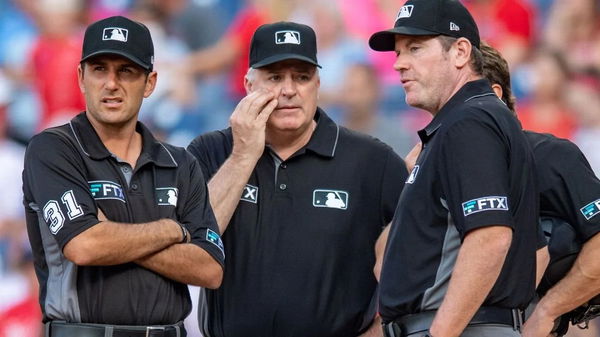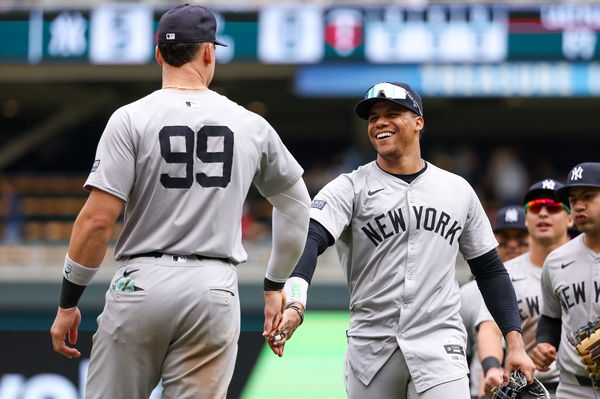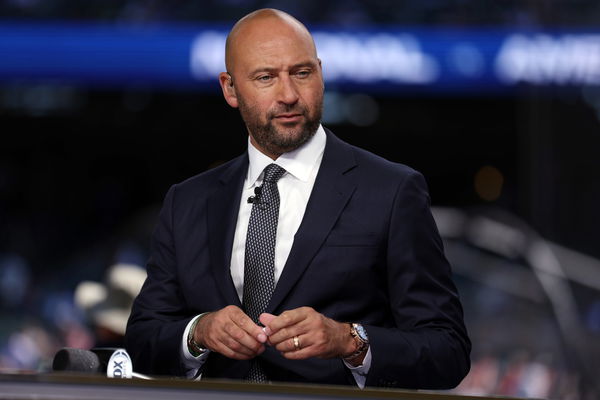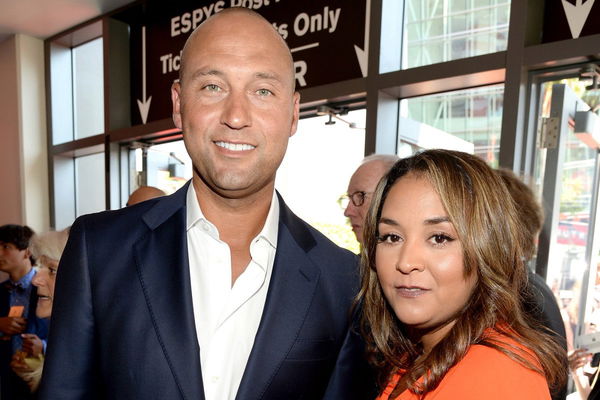MLB Umpire Salary: Inside Surprising Salaries of MLB Umpires Like Hunter Wendelstedt & Ryan Blakney

Follow Us

They bear the brunt of furious players, relentless booing from the crowd, and get roasted mercilessly on social media when they blow a call. Yet, despite their central role in the game, MLB umpires remain underpaid and largely misunderstood compared to the superstar athletes they officiate. Sure, a starting MLB umpire salary of $150,000 a year isn’t chump change, but it’s a stark contrast to the multi-million-dollar contracts of the players on the field.
The job of an MLB umpire also demands remarkable sacrifices. There’s the grueling, unpredictable travel schedule, the constant scrutiny, and the mental strain of making split-second calls that can define a game’s outcome. Before landing that coveted big-league job, aspiring umpires endure years toiling in low-paying minor leagues, hoping for a chance to reach the pinnacle of their profession. Let’s pull back the curtain and take a detailed look at the salaries, the challenges, and the surprising world of MLB umpiring.
MLB Umpire Salary: From rookies to veterans and the power of playoffs
ADVERTISEMENT
Article continues below this ad
Let’s be real: when a rookie umpire steps behind the plate for his first MLB game, he’s not exactly rolling in the dough. Sure, that starting salary of around $150,000 beats flipping burgers, but those umpiring dreams don’t come cheap. Years spent sweating it out in the minor leagues, facing endless scrutiny on a shoestring budget, mean those first few big-league paychecks are a hard-won reward. But that’s just the start—there’s a serious financial upside buried within the grind.
There are only 76 umpires in the Majors. Before the season, umpires are put into 4-man crews, each headed by a crew chief assigned by the Commissioner. The minimum salary for a #MLB umpire is reported to be $150,000 but salaries increase with years of service @MLBUA #baseball pic.twitter.com/oLYcyz7Btj
— FunBaseballFacts (@FunBaseballFact) November 12, 2023
See, in the world of MLB umpiring, experience pays off—literally. Seasoned veterans with a decade or more under their belts are pulling in some serious cash. We’re talking upwards of $450,000 a year. Now, that’s the kind of salary that finally justifies the relentless travel, the angry tirades from managers, and those brutally unforgiving hot takes on sports talk radio. But remember, reaching that income level takes time, dedication, and the ability to consistently make those razor-sharp calls under unbelievable pressure.
Trending

Amidst Juan Soto’s $600 Million Decision, Aaron Boone Makes A Plea to Yankees Owner Hal Steinbrenner to Call Scott Boras
May 18, 2024 10:56 AM EDT

“Dodgers, You Can’t Do That”: 13,000 People Left Heartbroken On Shohei Ohtani Bobblehead Night, According to Rich Eisen and Co
May 18, 2024 01:00 PM EDT

$625 Million Not Enough to Keep Juan Soto In New York? Yankees Might Forced to Break Shohei Ohtani’s $700 Million Price Record
May 17, 2024 07:00 PM EDT

Derek Jeter Suffers $8.7 Million Loss As His New York Castle Hits the Market At A Shockingly Reduced Price
May 18, 2024 05:20 PM EDT

“Stop Derek. Leave Her Alone”: Derek Jeter’s Sister Joins Rest of MLB World In Poking Fun at Him For Getting Humbled By His Daughter
May 14, 2024 02:00 PM EDT
Get instantly notified of the hottest MLB stories via Google! Click on Follow Us and Tap the Blue Star.

Follow Us
Of course, there’s one more way for those umpire bank accounts to get a serious boost: the postseason. Officiating playoff games, especially the nail-biter drama of the World Series, comes with hefty bonuses. We’re talking upwards of $20,000 extra for those coveted World Series assignments. It’s a serious bump, and those extra zeros on the paycheck can help ease the sting of another missed holiday with the family, or a grueling doubleheader on a scorching July afternoon.
While regular-season pay tops out around $450,000 for the most experienced umpires, those lucky enough to score postseason gigs can see their yearly earnings jump significantly. Playoff time definitely isn’t just about the glory; it’s about hard-earned compensation.
Bottom line: while the rookie umpire might not be heading out for champagne and caviar after a game, those who stick it out, prove their mettle, and get those prestigious postseason assignments can definitely live a comfortable life, even if it doesn’t come close to rivaling the millions the players are raking in. But remember, the path to that comfortable life is paved with years of minor league dues and constant scrutiny. So, how does an MLB umpire’s salary really stack up against that of athletes and other professionals?
How MLB umpire salary stacks up against athletes and other professionals
MLB umpires live in a different financial league than the players on the field. Rookie umpires start around $150,000 per year, while even veteran umps top out at around $450,000. Compare that to the 2023 MLB minimum salary of $720,000, and it’s clear even the lowest-paid player earns substantially more than a seasoned umpire. Star players pulling in $30+ million annually? That’s a completely different universe.
Those NFL and NBA refs aren’t in such a bad spot after all. Experienced refs in both leagues can earn between $200,000 and $500,000, comparable to their baseball counterparts. It seems enduring furious coaches and scrutiny under instant replay carries a similar price tag across the major leagues.
what profession other than mlb umpire can you routinely fail and essentially change the rules and keep your 300k salary with no threat of getting fired. it’s one of the craziest practices in all of modern world society
— semaj norbel (@squeebasarasrex) July 9, 2021
Now, let’s look beyond the sports world. While a top-earning MLB umpire might make as much as a general practitioner ($200,000 annually on average), that number pales in comparison to medical specialists. Orthopedic surgeons, for example, have an average salary of around $550,000 to $600,000. Experienced corporate lawyers can earn similar figures or higher. The financial rewards for those traditional career paths with years of training far outweigh what even the best umpires can expect.
Being an MLB umpire certainly isn’t a path to poverty. However, considering the intense mental strain, relentless criticism, and unpredictable, travel-heavy lifestyle, it puts into perspective just how demanding the job is compared to similarly compensated, but far less scrutinized, professions. The respect is well-earned, and perhaps those MLB paychecks need re-examining.
The Umpire’s Burden: Travel, scrutiny, and high-stakes pressure cooker
An umpire’s world isn’t all bonus checks and World Series dreams. It’s a life lived out of suitcases, a whirlwind of red-eye flights, and lonely hotel rooms. Umpires miss birthdays, weddings, and watching their own kids grow up, all in service of the game. Their days are long and unpredictable—pregame meetings hours before the first pitch, intense night games stretching past midnight, followed by another flight to the next city. A healthy sleep schedule? Forget about it. And that’s just the physical strain.
Mentally, the pressure is relentless. Imagine knowing that every ball or strike call, every close play at the bag, could ignite a firestorm of criticism. The scrutiny from fans is brutal, the media vultures are circling, and even the league itself uses high-definition cameras to dissect every decision. It takes a special kind of mental fortitude to not just survive but thrive under that constant spotlight.
#Postseason ump cam >>>> pic.twitter.com/VdP1rgn6lL
— MLB (@MLB) October 16, 2023
Getting to the big leagues is no walk in the park; it is more like a grueling uphill marathon. Start with umpire school, where the rulebook isn’t just memorized; it’s practically tattooed on your brain. Then comes the real test: the minor leagues. Low pay, long bus rides to small towns nobody’s heard of, and relentless evaluation with every call. Your performance is picked apart by eagle-eyed supervisors, and that coveted MLB promotion seems agonizingly out of reach. Those minor league years are a trial by fire, where wannabes get weeded out, and only those with unwavering accuracy and nerves of steel get the call-up. If you make it, it’s because you’ve earned it through countless hours of work, unseen by the crowds but crucial to the functioning of the game.
Do you think being a major league hitter is hard? Try being the guy behind the plate and calling those pitches. Umpires have milliseconds to decide – ball or strike? Fair or foul? Out or safe? One wrong call changes everything: a batter walks instead of striking out, a runner is erased instead of loading the bases, and a manager explodes in a fit of rage. These guys aren’t just rulebook robots; they’re psychologists, knowing when to defuse a tense situation, when to be firm, and how to keep the game flowing despite the chaos swirling around them. Fans might only see the guy who messed up, but behind the mask, there’s a symphony of mechanics, rule knowledge, and split-second judgment that goes underappreciated until it goes very, very wrong.
The Year of the Umpire? Debating Hunter Wendelstedt, Ryan Blakney, and questionable calls
Hunter Wendelstedt and Ryan Blakney—they’re the umpires that can bring a game screeching to a halt. Fans either groan in anticipation or cheer with a twisted sense of glee when their names appear on the lineup card. They’re synonymous with eyebrow-raising calls, fiery ejections, and a kind of mystique that makes players and managers simultaneously wary and frustrated. Sure, all umps make mistakes, but these guys seem to have controversy built into their job descriptions.
It’s very funny that MLB allows the umpire union to take the stance of no umpire can be fired for poor performance when no other profession allows this. And what’s even better is everyone is so aware of it and it’s been a thing for so long that it’s kind of just written off
— Eric Biolos (@EricBiolos) April 7, 2024
Wendelstedt inherited that hair-trigger temper from his legendary dad, Harry. That unjustified Aaron Boone meltdown because of a fan’s scream from the bleachers back in April in a New York Yankees-Oakland A’s game wasn’t a surprise to anyone who’s followed Wendelstedt’s career. Players complain he’s got a strike zone the size of a postage stamp on some days and then as wide as the interstate on others. A bit of that old-school umpire intimidation tactic, maybe? Fans either love the theatrics or despise the inconsistency, but Wendelstedt doesn’t seem to care either way. Blakney, on the other hand, is harder to read.
He’s less of a hothead, but that Aaron Judge ejection from the recent Detroit Tigers’ match in May had everyone scratching their heads. Pitchers love it when he’s generous with the outside corner, but hitters despise the way his strike zone seems to mysteriously shift mid-game. Managers know Blakney can have a short fuse when it comes to arguing, so they pick their battles carefully. It’s that psychological edge that savvy umps cultivate to maintain control on the field.
Enough is enough! @MLB needs to tell their umpires to check their egos before coming on the field. A week ago it was Hunter Wendelstedt and today it was Ryan Blakney ejecting Judge. A stupid overreaction!!!@YESNetwork @BleavNetwork @MatthewStucko @DanBasone
— RUSS SALZBERG (@russsalzberg) May 4, 2024
These high-profile incidents shape an umpire’s reputation, and the league tracks this stuff meticulously. Every overturned call, every manager dust-up—it all goes in the file. But, and here’s the kicker: it doesn’t seem to impact those paychecks much. Bad calls? Sure. But unless they do something truly egregious, that MLB umpire salary is pretty secure. Wendelstedt and Blakney, with their name recognition and years of service, are likely pulling down those fat checks in the $300-400K range, even if the fans think they’re blind. Hey, at least their bank accounts love them, right?
The Fight for Fairness: Umpires, unions, and the business of baseball
ADVERTISEMENT
Article continues below this ad
In the high-stakes world of professional sports, where millions of dollars and star reputations are on the line, a strong union is paramount. The MLB Umpires Association serves as the collective bargaining power for those in blue. They don’t just negotiate salaries but also advocate for better working conditions, fair evaluation processes, and even have a say in the ever-evolving rulebook. While fans might think primarily of players when it comes to unions, the UMPA plays a crucial role in ensuring umpires are compensated and treated fairly within the MLB system.
The umpire union must be run by untouchables cause THIS should lead to termination @MLB @Jared_Carrabis https://t.co/GZpTZGmFUo
— 👾 (@hazywillnot) May 2, 2024
ADVERTISEMENT
Article continues below this ad
Unlike baseball stars who retire with endorsement deals and broadcasting gigs waiting, umpires face a stark transition. While MLB does provide some pension and post-career support, it’s nothing compared to the safety net players enjoy. Stepping away from the high-intensity, travel-heavy, spotlight-filled life of a professional umpire can be jarring. Some may find it hard to replace the adrenaline rush of calling the World Series with a quieter, more anonymous existence. Organizations dedicated to helping retired umpires adjust to civilian life could be crucial in ensuring a smooth transition for these unsung heroes of the diamond.
It is no news that umpires are easy targets for our frustration. They’re often the first to get blamed when our favorite team loses a close game, especially after a questionable call. But behind the stoic faces and seemingly unflappable demeanor, there’s a world of sacrifice, intense pressure, and an MLB Umpire Salary structure that, while comfortable, doesn’t reflect the unique challenges and relentless scrutiny those in the face.
Edited by:

Arunima Bhanot

